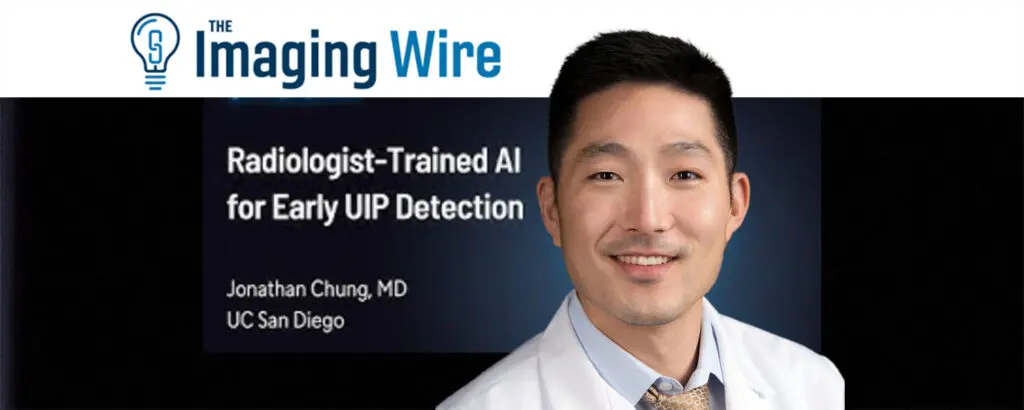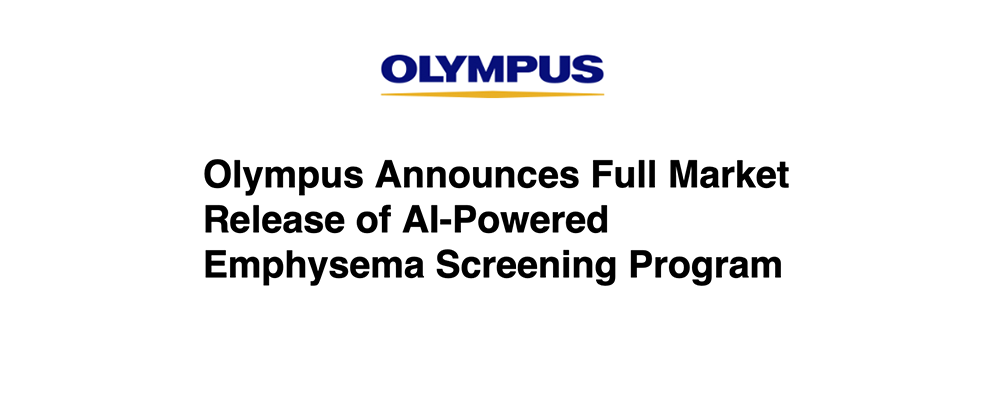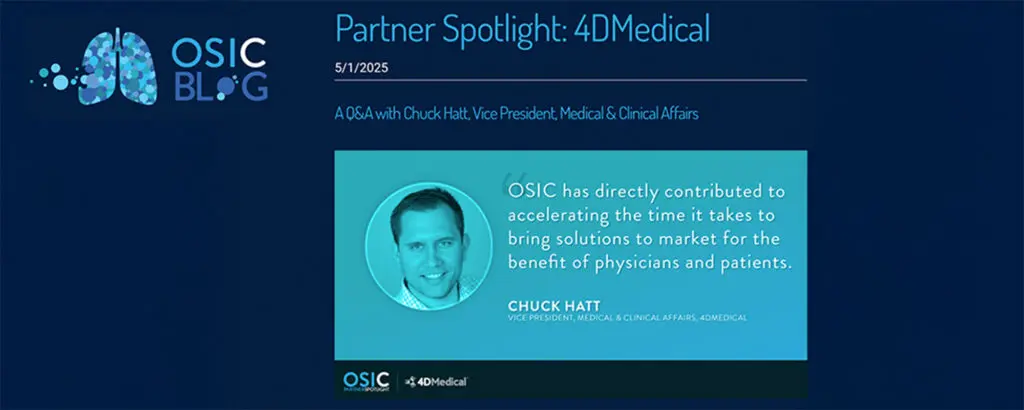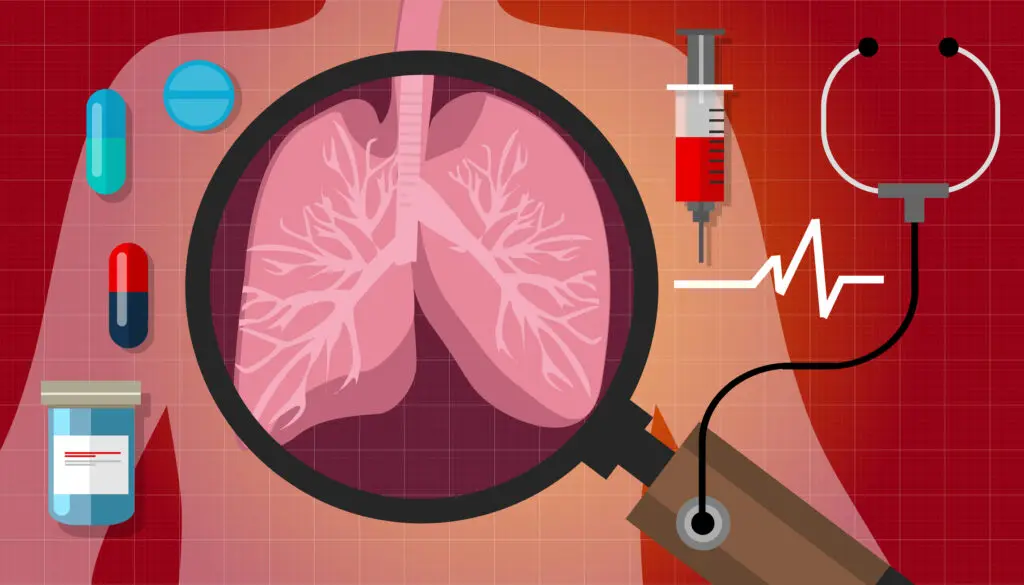Understanding Lung Perfusion: What is it? Why does it matter? And how is it measured?

Early identification of Usual Interstitial Pneumonia (UIP) and diagnosis of Idiopathic Pulmonary Fibrosis (IPF) remains a significant challenge in pulmonary medicine. Despite advances in imaging and clinical awareness, the process still requires specialized training and experience that isn’t always readily available—especially in non-urban or resource-limited healthcare settings. This gap can delay diagnosis which critically impacts patient outcomes.
In a recent interview hosted by Brian Casey, editor at The Imaging Wire, Dr. Chung, a leading thoracic radiologist, offers valuable perspective on the complexities associated with UIP identification and the essential role of expert interpretation to achieve accurate diagnoses.
Addressing the Challenge of UIP—and IPF Diagnosis: A Conversation with Dr. Chung

Early identification of Usual Interstitial Pneumonia (UIP) and diagnosis of Idiopathic Pulmonary Fibrosis (IPF) remains a significant challenge in pulmonary medicine. Despite advances in imaging and clinical awareness, the process still requires specialized training and experience that isn’t always readily available—especially in non-urban or resource-limited healthcare settings. This gap can delay diagnosis which critically impacts patient outcomes.
In a recent interview hosted by Brian Casey, editor at The Imaging Wire, Dr. Chung, a leading thoracic radiologist, offers valuable perspective on the complexities associated with UIP identification and the essential role of expert interpretation to achieve accurate diagnoses.
Olympus Launches Emphysema Screening Program Powered by 4DMedical, Expanding Early Diagnosis and Treatment Opportunities

A new peer-reviewed study published in Respiratory Research confirms that 4DMedical’s CT Lung Ventilation Analysis Software (CT LVAS) provides results comparable to those of the gold standard PET method, as well as two additional research techniques for assessing regional lung function. The findings demonstrate a strong association and agreement between 4DMedical’s CT LVAS and PET-ventilation at the lobar level and comparable correlation at the voxel level. Utilizing routine non-contrast CT scans, CT LVAS generates detailed regional ventilation information. This highlights CT LVAS as a safe and contrast-free modality for functional lung imaging, making it an ideal tool for assessing lung function across a range of respiratory conditions.
Partner Spotlight: 4DMedical Featured by OSIC

We’re thrilled to be featured in the latest OSIC Partner Spotlight, where Chuck Hatt, our Vice President of Medical & Clinical Affairs, discusses 4DMedical’s leadership in transforming pulmonary diagnostics. The blog highlights our commitment to advancing lung health through innovative, non-invasive imaging solutions powered by AI, including the FDA-cleared IQ-UIP™ software developed to improve early detection of idiopathic pulmonary fibrosis (IPF).
Lung Imaging Trends

Lung imaging is entering a new era with advancements in AI, machine learning, and innovative imaging techniques. Historically, diagnosing chronic respiratory conditions like asthma, COPD, and bronchiectasis has been difficult. Patients may report regular symptoms, yet their lungs often look “unremarkable” on traditional imaging methods. In many cases, a lung biopsy, which is costly and risky, is required to confirm a diagnosis. Today, new technologies offer unprecedented insights into lung health, using advanced processing systems to analyze large volumes of scans and identify diseases without requiring invasive procedures. This enables earlier detection and more personalized treatment options than ever before.
Bridging the Gap: Overcoming Barriers to Preventive Cancer Screenings for At-Risk Populations

A recent study conducted at Massachusetts General Hospital in Boston revealed that patients who are most in need of preventive screenings for breast, lung, and colorectal cancers are actually less likely to receive screenings compared to patients with lower risk factors. For many cancers, like lung cancer, the disease is often diagnosed at later stages, making treatment more difficult. Preventive lung CT scans have been shown to reduce lung cancer mortality by 20–25% in high-risk populations.
Reducing the Burden on Healthcare Systems: The Efficiency of 4D Imaging in Respiratory Medicine

Anyone who has faced a health challenge knows that a diagnosis can take time, often, a lot of time. Studies suggest that the average patient can wait 25 to 1,800 days for a diagnosis, and the National Institutes of Health (NIH) reports that this timeline can extend to four to five years for rare or complex diseases.
Lung diseases are challenging to diagnose, as symptoms develop gradually over many years. For instance, a patient with Chronic Obstructive Pulmonary Disease (COPD) might experience a decade of cough, frequent respiratory infections, and breathlessness during exercise before receiving a formal diagnosis.
AI-Driven CT Innovations from 4DMedical Transform COPD Diagnosis and Patient Care

As COPD continues to grow as a global health burden—predicted by the World Health Organization (WHO) to become the third leading cause of death by 2030—innovative AI-driven medical imaging technologies are rapidly advancing diagnosis, staging, and treatment. In a recent Radiology Today article, “Breathing Room,” writer Beth W. Orenstein explores how clinicians are increasingly relying on advanced CT imaging solutions.
Price Transparency and Radiology: A Necessity for Better Patient Care

Recent findings published in the Journal of the American College of Radiology highlight a concerning trend: high out-of-pocket costs for imaging procedures can delay necessary medical diagnoses, potentially impacting patient outcomes. This underscores the critical role of price transparency in radiology.
Regional Lung Volume Changes with Non-Invasive Positive Pressure Ventilation in Healthy Adults

This study highlights the potential of using XV, an advanced functional imaging tool, to better understand regional lung function and optimize the therapeutic application of Non-Invasive Positive Pressure Ventilation (NIPPV). These insights could pave the way for improved patient outcomes for individuals with respiratory conditions, by tailoring interventions to improve their lung function. The ability to non-invasively visualize and measure these regional changes marks a substantial advancement for both clinicians and researchers involved in respiratory care, potentially transforming treatment strategies and patient management.
